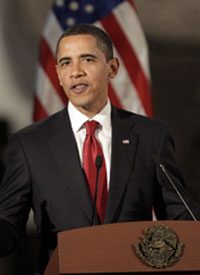
Supporters of the Second Amendment have blasted the agreement as a dangerous infringement on the right to keep and bear arms and another attack on U.S. sovereignty. The agreement would create a national database of gun owners in America that could then be accessed by other signatory nations. It would even provide for the extradition of people found to be in violation of the terms.
“It would clear the way for imposing a national gun registry [and] would overturn the current prohibition on keeping centralized firearms records by the federal government,” explained Larry Pratt, the executive director of Gun Owners of America. “It reflects a deep distrust that the government of the United States has had towards the people.” The National Rifle Association has also issued a statement indicating that it will “vigorously oppose any international effort to restrict the constitutional rights of law-abiding American gun owners."
The treaty has already been ratified by 30 countries out of 34 in the Organization for American States (OAS), including the Dominican Republic, which signed on at the end of April. José Miguel Insulza, the secretary-general of the OAS, noted at the signing that the treaty “particularly stresses the needs for arms control; arms confiscation; regulating authorizations and licenses for export, import and transit; and strengthening controls at export points.” He added that “it was with great satisfaction” that he received the news about Obama prioritizing the treaty.
"As President Calderón and I discussed, I am urging the Senate in the United States to ratify an inter-American treaty known as CIFTA to curb small arms trafficking that is a source of so many of the weapons used in this drug war," President Obama proclaimed in Mexico City last month. He also incorrectly repeated the errant statistic that 90 percent of guns in the hands of Mexican drug cartels come from America. (In actuality, according to ATF special agent William Newell, about 17 percent of guns associated with crime in Mexico came from the United States. And this figure has not been broken down to see how many came from civilian gun shops and how many were purchased from the U.S. military by Mexico’s government.) "We’re going to be very focused on this. It’s going to be a top priority." ABC News quoted an administration official who said that Obama "felt that it was important to push now for the ratification of this treaty because the question of illegal small-arms is of great concern to the countries throughout the hemisphere a[s] it affects their safety.”
Some U.S. senators are already preparing to fight the treaty, including Republican Sen. John Barrasso of Wyoming. “The President said it is a very high priority for him to get this treaty that takes away our second amendment rights ratified by the Senate,” Barrasso explained. “It is a very high priority for me to make sure that this treaty never gets ratified by the United States Senate, and we will find the votes to defeat it.” Other senators gearing up to oppose the treaty include John Cornyn of Texas and James Inhofe of Oklahoma, who said they will oppose the effort due to concerns about U.S. sovereignty and the rights of Americans.
Senate Majority Leader Harry Reid of Nevada was relatively non-committal, saying; “We must work with Mexico to curtail the violence and drug trafficking on America’s southern border, and must protect Americans’ Second Amendment rights. I look forward to working with the president to ensure we do both in a responsible way.” According to reports, Senate Foreign Relations Committee Chairman John Kerry supports the treaty. But in order for it to be approved, it must be ratified in the Senate by a two-thirds majority vote.
— Photo: AP Images


